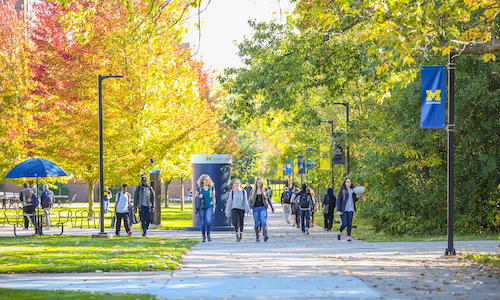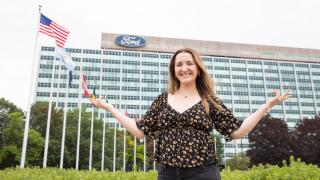
University of Michigan-Dearborn has received a $1.2 million grant from the U.S. Department of Education to implement a math and science program for underrepresented youth.
The Office of Enrollment Management and Student Life (EMSL) recently received a five-year renewable federal grant to implement an Upward Bound Math and Science Program, which encourages high school students to develop their potential to excel in math and science and to pursue a career in science, technology, engineering and mathematics (STEM) fields.
Assistant Director for Outreach Programs Perry Boyd II, who worked to bring the program to campus, said the grant will allow the university to work with an additional 60 local youth. Boyd, who will serve as director for the program, was notified of the award in November.
“The university has a vision of metropolitan impact, so we need to be out in the community making that impact, that positive change,” he said. “Most of UM-Dearborn’s students come from the southeast Michigan region and this grant gives us an opportunity to engage with local high school students to better prepare them for higher education and career opportunities.”
Boyd is working with Robichaud Senior High School—a Westwood Community District School with students from Dearborn, Dearborn Heights and Inkster—to select participants from grades 9-12. The Robichaud staff has partnered with UM-Dearborn several times in the past, and the secondary school was interested in supporting this opportunity for their youth.
“Many of the freshmen who enter the high school are not ready for the academic rigor. It’s hard to get caught up. The Upward Bound Math and Science Program will aid in the efforts to increase student performance,” said Boyd, noting that 86 percent of students entering Robichaud test below average on the M-STEP Mathematic Test, compared to the state average of 40 percent. “And we want to do that as soon as possible. We plan to have students start the program in January.”
Boyd is in the process of hiring an assistant director and outreach specialist for the program. These two positions would have an office at the high school and would spend 50 percent of their time there to be more accessible to students.
Boyd also has lined up STEM activities for participants, which include learning agricultural science on an urban farm, coding on a computer, using a 3-D printer, taking part in NASA’s Big Idea Challenge and more.
The majority of the instruction will take place on Robichaud’s campus during the school week to make the program more accessible to students. The program will include guest speakers from UM-Dearborn, The Greening of Detroit, Lawrence Technological Institute, the Detroit FBI Field Office and others. Field trips also are planned.
After the first year, UM-Dearborn’s Upward Bound Program will assess progress, gather feedback and re-adjust according to student needs.
The goal is for this student cohort to have a four percent higher college graduation rate than the school’s current average. But along the way, Boyd wants the program to aid students in increasing their proficiency in the math and science, graduating from high school, and gaining employable skills.
“We are going to see how the students develop over the course of five years,” Boyd said. “Through Upward Bound, we’ll stress the importance of skills, education, and contributing to the fields of math and science. By the time they leave Upward Bound, I hope to write them letters of recommendation.”




